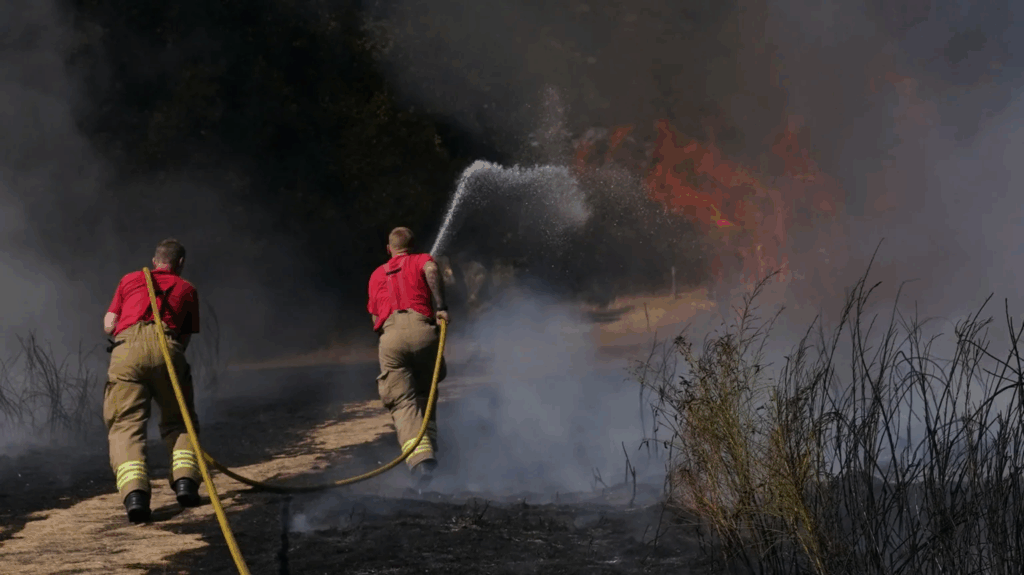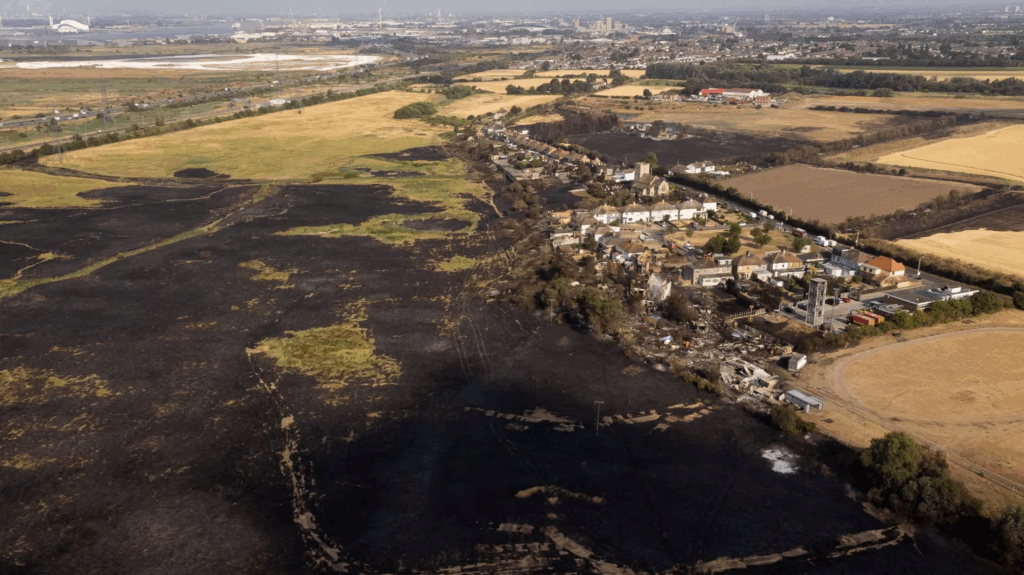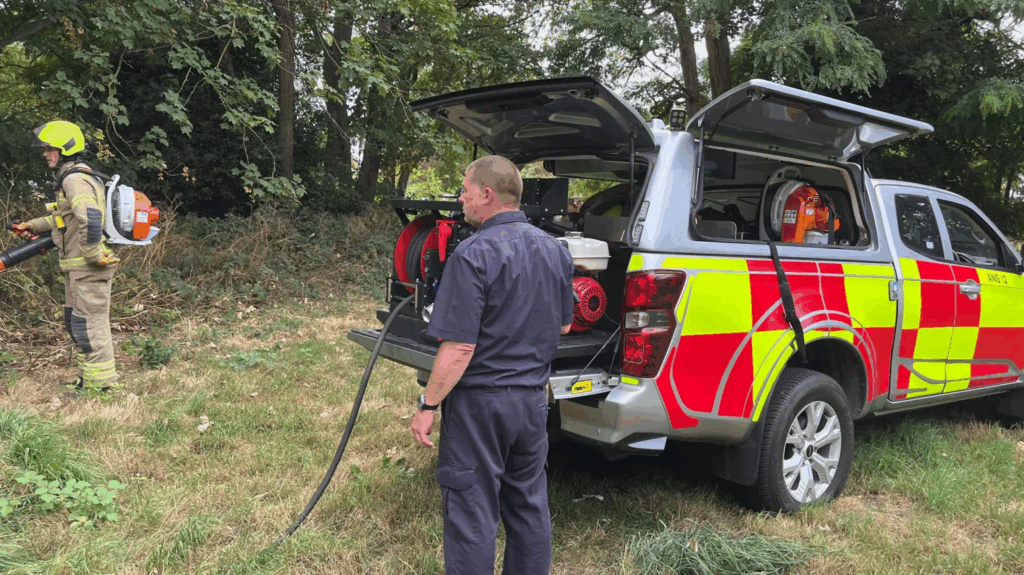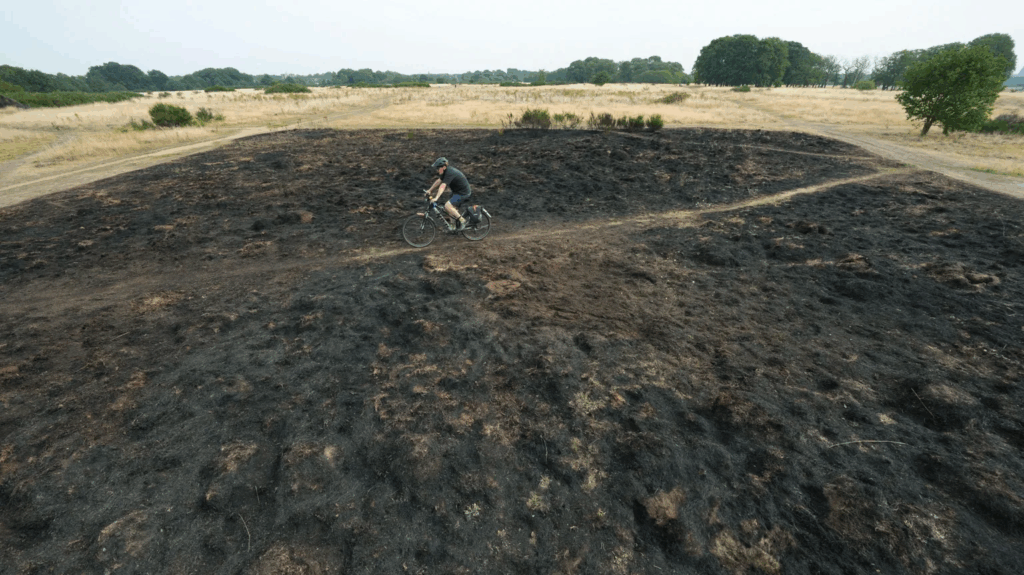Extreme Temperature Diary- Monday September 8th, 2025/ Main Topic: A London Summer of Wildfires and Scorched Earth – Guy On Climate
Dear Diary. I’ve been reporting on increasing wildfires around the planet the last few years due to climate change. The most numerous are coming from the western U.S., Mediterranean countries, and Australia. Oddly, one of the most destructive wildfires occurred in traditionally tropically moist Hawaii in Lahaina in 2023:
Maui joins the list of deadliest wildfires in recorded U.S. history : NPR
The deadliest wildfires on record in U.S. historyThe Maui wildfire, with a death toll of 99 as of Monday, ranks among the top 10 deadliest wildfires since 1871.
nameyearmonthstatefatalitiesPeshtigoCloquet and Moose Lake FiresGreat Hinckley FireThumb FireGreat Fire of 1910Camp FireYacolt Burn2017 October Fire Siege2020 Fire SiegeGriffith Park|
| 1871 | October | Wisconsin | 1,152 | | 1918 | October | Minnesota and Wisconsin | 453 | | 1894 | September | Minnesota | 418 | | 1881 | September | Michigan | 282 | | 1910 | August | Idaho, Montana and Washington | 87 | | 2018 | November | California | 86 | | 1902 | September | Washington and Oregon | 65 | | 2017 | October | California | 44 | | 2020 | August | California | 31 | | 1933 | October | California | 29 |
Cool rainy Great Britain should be one place immune to a warming climate, right? Wrong. The summer of 2025 has brought wildfires to that country, as well, and it’s no wonder:
UK 2025 SUMMER: THE HOTTEST IN HISTORY
With an average temperature of 16.1C and an anomaly of +1.51C above the 1991/2020 norm, Summer 2025 in UK was the hottest in climatic history.
Very dry conditions persisted specially in England.
Maps by Met Office — Extreme Temperatures Around the World (@extremetemps.bsky.social) 2025-09-03T13:44:14.364Z
No place is immune from climate change related wildfires. Here are more details from the BBC:
This summer, there were 83 wildfires across London - over *three times* as many as in the summer of 2020.
The climate crisis is on our doorstep. I am determined to do everything possible to ensure we are prepared for the ongoing impact of wildfires and extreme heat. — Mayor of London, Sadiq Khan (@london.gov.uk) 2025-09-07T15:26:03.831Z
London summers: Wildfires and scorched earth
London summers: Wildfires and scorched earth22 August 2025
Tom Edwards Environment correspondent, London, Enfield, London
 Firefighters tackled a grass fire in Leyton in early August Firefighters tackled a grass fire in Leyton in early August
So far there have been four heatwaves this summer in London.
And while the weather may be cooling off, firefighters at Enfield station don’t think they’re quite out of the woods just yet.
London’s parks and open spaces remain tinder dry, the ground is still rock hard containing very little moisture and the wildfire threat is still very real.
Already this summer there have been 64 wildfires in London, the most since 2022. In 2019, there were just 19.
All were started by people – mostly accidentally although many are started deliberately.
For the London Fire Brigade (LFB), wildfires and grass fires are the new normal and it has meant a step change in how they deal with them.
 The fire in Wennington in 2022 led to a review of how the LFB coped The fire in Wennington in 2022 led to a review of how the LFB coped
On 19 July 2022, LFB was given a wake up call.
In Wennington, Havering, right on the “rural-urban interface” between city and country in east London, a wildfire broke out.
The “rural-urban interface” – as the LFB calls it – is where the risk to property is most severe.
The day was said to be one of LFB’s “busiest days in the modern firefighting era” with 2,496 calls received – including 740 relating to wildfires – and 26 fires requiring four or more pumping appliances to attend.
In Wennington, the fire was quick moving and 16 homes were destroyed. It led to a review of how the LFB coped.
Why London Fire Brigade is running wildfire drills Action needed before wildfire season, LFB urges London prepares for ‘clear risk’ of climate change firesThe major incident review said staff had responded to the “unprecedented demand with bravery, tenacity and determination”.
“Without this concerted and coordinated effort there is no doubt the damage to London’s communities would have been much worse,” it added.
But it found that 39 appliances were “off the run” – unavailable – because of insufficient staff numbers.
It also found the LFB did not have a fully qualified wildfire tactical adviser and the brigade needed to do more to ensure its incident commanders could properly assess how to deal with wildfires and develop better tactical plans.
Since then, to deal with the increasing threat of wildfires in the capital, the brigade created 10 wildfire officers and 30 wildfire tactical advisers, who will be trained in the more rural areas of England where wildfires are more common.
New types of equipment were also introduced.
The changes have not been cheap. They were partly funded from City Hall as part of a £40m transformation fund.
 Ken Spratt, LFB’s wildfire lead, said drier springs and summers are leading to more wildfires Ken Spratt, LFB’s wildfire lead, said drier springs and summers are leading to more wildfires
Ken Spratt, LFB’s wildfire lead, said: “Grass fires have always been a thing, but with climate change we are seeing longer, drier summers.
“This year we had a really dry spring as well which means we are seeing larger numbers of grass fires, and wildfires have larger intensity as well.”
More emphasis is being put on the LFB giving advice to authorities to keep grass and vegetation cut back near homes and flats.
The tactic is now to send large numbers of fire engines to grass fires and try to deal with them quickly as unlike more rural services, the fires are usually close to homes.
If it needs more than four engines, then the specialist wildfire vehicles and equipment are called in. It is then classed as a wildfire.
 The fire in Wennington was quick moving and16 homes were destroyed The fire in Wennington was quick moving and16 homes were destroyed
It is the wind that makes wildfires so difficult to tackle, according to firefighters.
Any wind can fan the fire and make them unpredictable. If you’re not in the right place it can also surround you. In very hot conditions, heatstroke can be an issue.
The LFB is trialling new wildfire vehicles which are 4x4s that can go where the large fire engines can’t. They are using drones and “holey hoses” that create a wall of water.
Phil Morton, LFB’s deputy assistant commissioner, said the wildlife vehicles help them “make a quick and sustained attack on a fire”.
The vehicles can also be on the move so crews can work along the fire’s edge more quickly.
“They provide us with the opportunity to work in an agile way, quickly and efficiently off-road and get to hard-to-reach places that ultimately a fire engine may struggle to get to,” Mr Morton added.
Part of the wildfire unit’s kit is also a misting lance that delivers a fine, high-pressure spray deep into the soil, cooling smouldering peat and roots so hidden fires cannot flare up again hours or even days later.
 Four new wildfire vehicles are being trialled by the LFB Four new wildfire vehicles are being trialled by the LFB
 Part of the wildfire unit’s kit is a misting lance that delivers a fine, high-pressure spray deep into the soil Part of the wildfire unit’s kit is a misting lance that delivers a fine, high-pressure spray deep into the soil
One area that has seen a number of fires this summer is Wanstead flats in east London.
Tony Jackson, a station commander for the LFB, said: “If you look down here the ground is really hard and dry and what we’re finding through the summers that we’re having now is the ground is getting really really dry.
“Wanstead Flats historically is known for having quite a lot of peat on it as well which does burn quite quickly and is deep seated but what comes into consideration here as well is human factor, human behaviour, you can have discarded cigarettes, barbecues, also comes into it is potentially glass, broken bottles, reflection from the sun when you’ve got high-intensity sun you can get reflection which can cause fires.”
 Parts of Wanstead flats are still black and charred Parts of Wanstead flats are still black and charred
England entered its fourth heatwave of the summer on 12 August, with a top temperature of 33.4C (92F) recorded in Northolt in north-west London.
While a warming climate will mean more heatwaves and more wildfire, almost 80 fires in locations such as open grassland, scrubland, woodland and parks have been recorded as deliberate since the start of June.
And the habitats that are hit by fire suffer and the real damage could take months to assess.
Caroline Haines, from the City of London Corporation, said the short-term impact on the natural habitat was “fierce”.
“There is no sound of birds. There’s no other sound this morning. And that’s because any wildlife that was here will have been pushed out,” she said.
“And the heat goes downwards as well, of course. So anything nesting just below the ground will also be affected.
“The trees around, perhaps by the autumn, when we have the leaf drop and the growth of the trees reduces. Then perhaps it won’t be until next spring when we really see the damage.”
London is facing new challenges with a changing climate.
Listen to the best of BBC Radio London on Sounds and follow BBC London on Facebook, X and Instagram. Send your story ideas to hello.bbclondon@bbc.co.uk
Four wildfires break out over 24 hours in London Homes evacuated as grassfire tackled in Dagenham Why London Fire Brigade is running wildfire drillsRelated internet links
London Fire Brigade
Here are more “ETs” recorded from around the planet the last couple of days, their consequences, and some extreme temperature outlooks, as well as any extreme precipitation reports:
EXCEPTIONAL WARM NIGHT IN FINLAND
DOZENS Sep High Minimum records
16.8 Vihti
16.5 Pyhajarvi
16.4 Viitasaari,Lappeenranta
16.3 Utti,Lohja,Jamsa
16.2 Juupajoki,Hameenlinna,Ahtari
16.1 Oulu and Jyvaskyla
15.8 Vesanto and Toholampi
15.6 Ruukki
15.5 Halsua
15.3 Multia and Kokkola
etc — Extreme Temperatures Around the World (@extremetemps.bsky.social) 2025-09-08T17:50:45.569Z
ANOTHER HISTORIC HOT DAY IN CHINA
Temperatures >40C in the East and 10 records heat for September broken including Hangzhou with 39.4C
The heat will continue in China both in the West (40C in Xinjiang tomorrow) and than again in the East
China's record heat seems never ending! — Extreme Temperatures Around the World (@extremetemps.bsky.social) 2025-09-08T12:21:12.120Z
EXTRAORDINARY HEAT IN JAPAN
Over 300 records for September smashed so far and the heat is just getting worse with heat indexes still reaching 50C+.
Today's new September records:
36.7 Motoyama
36.6 Hamamatsu
36.5 Kiso
35.9 Mishou
35.4 Taketa
35.3 Edogawa
35.1 Sakahata
34.2 Oizumi — Extreme Temperatures Around the World (@extremetemps.bsky.social) 2025-09-08T08:11:43.459Z
JAPAN ENDLESS RECORD HEAT
After a scorching hot day,another warm and humid night, like a sauna 24/7.
New records of September highest Minimums:
28.0 Saigo
27.5 Cape Saigo
27.4 Ama
27.5 Wainura
More record heat are expected in this hellish and endless summer. — Extreme Temperatures Around the World (@extremetemps.bsky.social) 2025-09-08T00:14:40.114Z
August 2025 in the INDONESIAN town of
Tarakan had an average temperature of 27.6C, 0.2C below the 1991/2020.
This was its first cooler than average month since March 2017, it means this incredible streak lasted exactly 100 consecutive months ! — Extreme Temperatures Around the World (@extremetemps.bsky.social) 2025-09-08T14:31:49.799Z
MEXICO🇲🇽 BETWEEN FLOODS AND HEAT
According to SMN,Mexico City was flooded by the most intense rainfall ratio in 73 years.
In the meanwhile,extremely hot and humid conditions in the Gulf
Minimums up to 29C at Chetumal and 22.8C at Rio Verde (1000m):record
Photo credit:TV Azteca — Extreme Temperatures Around the World (@extremetemps.bsky.social) 2025-09-07T19:39:23.888Z
CANADA
Very warm in the far West and far East and very cold in the central provinces.
MINIMUMS 20C/21C both at Lytton BC and in several stations of Nova Scotia and New Brunswick.
Warm day in Newfoundland and Labrador (close to records) with an expected record warm night coming — Extreme Temperatures Around the World (@extremetemps.bsky.social) 2025-09-07T22:24:46.336Z
August 2025 was the third warmest August on record after 2023 and 2024 at approximately 1.3C above preindustrial levels.
This continues a string of recent months a bit cooler than the exceptional 2023/2024 temperatures but warmer than any prior years. — Zeke Hausfather (@hausfath.bsky.social) 2025-09-07T15:00:56.000Z
Gulf temps are now record hot for this time of year. It’s steroids for hurricanes. Luckily the Gulf remains hostile for tropical development for at least the next 10 days. Hopefully the Gulf stays hostile through October. — Jeff Berardelli (@weatherprof.bsky.social) 2025-09-08T01:23:11.654Z
"Friction between the shelf and the water causes the current just beneath the ice to slow. This slowdown leads to strong mixing within the ocean, and this mixing brings heat to the ice base, driving high melt rates." Strong Tides Speed Meleting of Antarctic Ice Shelves
eos.org/research-spo... — Silicon Valley North - Citizens Climate Lobby (@cclsvn.bsky.social) 2025-09-08T14:51:31.899Z
Wasting Science Dollars by DJT; #Europe; #Asia, #Africa Cookoff; SFBay Ecosystems; ClimateAction Bills; The Speed of #RenewableEnergy Deployment; The Fiery London Summer and more on @climateguyw.bsky.social 's Extreme Temperature Diary this Sunday. More:
guyonclimate.com/2025/09/07/e... — Silicon Valley North - Citizens Climate Lobby (@cclsvn.bsky.social) 2025-09-07T21:53:54.099Z
Well, it's the climatological peak week of hurricane season for the Atlantic, but you wouldn’t know it from the level of activity. The latest from @bhensonweather.bsky.social and I: yaleclimateconnections.org/2025/09/anot... — Dr. Jeff Masters (@drjeffmasters.bsky.social) 2025-09-08T16:19:48.361Z
National Weather Service to survey damage in wake of reported tornado in Holden — MassLive (@masslive.bsky.social) 2025-09-08T12:28:05.636Z
#RenewableEnergy.
“There’s no actual justification to stop the project.” Lawsuits Follow Wind Farm Construction Stoppage.
www.nytimes.com/2025/09/04/c... — Silicon Valley North - Citizens Climate Lobby (@cclsvn.bsky.social) 2025-09-08T14:11:39.750Z
California is through the hottest part of summer, and fossil gas use is 19% less than '24 and 39% less than '23
56% of electricity from WWS this year.
177/249 days (71%) with >100% WWS, for an avg of 4.2 h/day among all days
Demand 1.6% less than '24 & '23 despite more AI, EVs, crypto, heat pumps — Mark Z. Jacobson (@mzjacobson.bsky.social) 2025-09-07T18:19:47.869Z
In a parallel with the devastating destruction of the Aral Sea, Lake Urmia in Iran -- once one of the world's largest saltwater lakes -- has now also been completely destroyed by overpumping, #water diversions, and increased evaporation from climate change.
www.kurdistan24.net/en/story/862... — Peter Gleick (@petergleick.bsky.social) 2025-09-07T20:26:16.268Z
#CZUComplexFire
“All these other things that are part of the system are taking advantage of all of the resources that the redwoods are now not able to monopolize”
www.mercurynews.com/2025/08/28/a... — Silicon Valley North - Citizens Climate Lobby (@cclsvn.bsky.social) 2025-09-08T14:02:02.832Z
#CZUComplexFire
“All these other things that are part of the system are taking advantage of all of the resources that the redwoods are now not able to monopolize”
www.mercurynews.com/2025/08/28/a... — Silicon Valley North - Citizens Climate Lobby (@cclsvn.bsky.social) 2025-09-08T14:02:02.832Z
|





 Firefighters tackled a grass fire in Leyton in early August
Firefighters tackled a grass fire in Leyton in early August The fire in Wennington in 2022 led to a review of how the LFB coped
The fire in Wennington in 2022 led to a review of how the LFB coped Ken Spratt, LFB’s wildfire lead, said drier springs and summers are leading to more wildfires
Ken Spratt, LFB’s wildfire lead, said drier springs and summers are leading to more wildfires The fire in Wennington was quick moving and16 homes were destroyed
The fire in Wennington was quick moving and16 homes were destroyed Four new wildfire vehicles are being trialled by the LFB
Four new wildfire vehicles are being trialled by the LFB Part of the wildfire unit’s kit is a misting lance that delivers a fine, high-pressure spray deep into the soil
Part of the wildfire unit’s kit is a misting lance that delivers a fine, high-pressure spray deep into the soil Parts of Wanstead flats are still black and charred
Parts of Wanstead flats are still black and charred